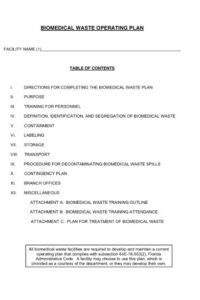Medical Waste, Inc FLORIDA Management and Proper Waste Segregation
The regulations in this presentation are specific to the state of Florida. For an overview of general regulations pertaining to regulated medical waste, refer to the training on Medicalwasteinc.com under
→ Required OSHA Compliance Training for Biohazardous Waste Disposal ←
Medical Waste, Inc.
2- Regulatory Authority
State of Florida Department of Health
– Bureau of Community Environmental Health
– Bureau of Community Environmental Health
3- Registration
Annual Generator Permit is Required
• Keep permit in view in facility Exemption
• Generators of less than 25 lbs in 30 day period for a period of 12 months
Registration Generator Permit Exemptions
Even exempt facilities:
– Must first get permit DOH form 4089
– Keep records for one year – Then prove exempt status
– Make Exemption Application using DOH form 4089
– Generator shall submit records from previous 12 months showing biomedical waste generated in each 30-day period during those 12 months was less than 25 pounds
– Documentation must include the weight of the biomedical waste generated in each 30-day period and may be in the form of monthly log or receipts
– If needed Weight report records may be requested from MEDICAL WASTE, INC Customer Service at email: info@medicalwasteinc.com
4- Management – Biomedical Waste Operating Plan
A written plan that includes:
– Description of training
– Procedures for segregating, labeling, packaging, transporting, storing, treating biomedical waste
– Procedures for decontaminating spills
– Contingency plan for emergencies
– A Biomedical Waste Operating Plan template is available at the DOH website
5- Contingency Plan
Be sure you have included a contingency plan in your Biomedical Waste Operating Plan that discusses how any potential disruptions in service due to hurricanes, etc., will be handled by you facility
6- Definitions
Florida Administrative Code (FAC) 64E-16
Contains a broader definition of Regulated Medical Waste than federal OSHA:
When biomedical waste is improperly managed, it places health care workers, sanitation workers, and the general public at risk for contracting dangerous diseases.
Section 381.0098, Florida Statutes
Chapter 64E-16
“Any solid or liquid which may present threat of infection to humans, including…”
http://www.doh.state.fl.us
7- Definitions
Non-liquid tissue
Body parts
Blood, blood products, body fluids from humans, other primates
Lab and veterinary wastes that contain human disease-causing agents
Sharps
Used, absorbent materials saturated with blood, blood products, body fluids, or excretions or secretions contaminated with visible blood
Absorbent materials saturated with blood or blood products that have drie
Non-absorbent, disposable devices that have been contaminated with blood, body fluids, secretions. or excretions visibly contaminated with blood
Exceptions:
Body excretions such as feces and secretions such as nasal discharges, saliva, sputum, sweat, tears, urine, and vomitus shall not be considered biomedical waste unless visibly contaminated with blood
8- Collection
Biomedical waste must be:
– Segregated, at point of origin, into red bags or sharps containers
– Sharps and non-sharps must be kept separate
– Segregate in room where produced; do not carry waste to another room to be segregated
9- Red Bags
Red bags must be:
– Be impermeable
– Display biological hazard symbol
At least 6” diameter on bags 19” x 14” – At least 1” diameter on smaller bags
– Have impact resistance of 165 grams
– Have tearing resistance of 480 grams
– Contain no greater than 100 ppm lead, mercury, hexavalent chromium, cadmium used for dyes in coloration of bags
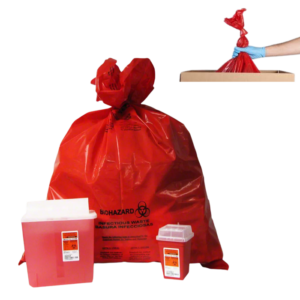
10- Storage – Designate in Plan
Interior Storage must have:
– Restricted access
– Smooth, easily cleanable materials
– No carpeting in area – rough cement must be sealed)
– Must be impervious to water
Exterior Storage:
– Must be locked and must display biohazard warning symbols
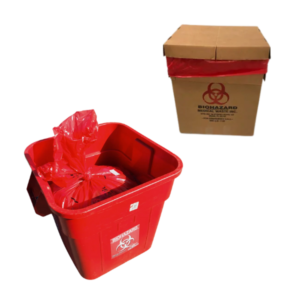
11- SpillKits/SpillSOPs
Transferring- Packaging must remain intact within the facility
Spills:
– Must be decontaminated
– Spill kit should be maintained
– Be sure to document in your training records that you have trained employees in how to manage spills
– Maintain a Spill Cleanup SOP
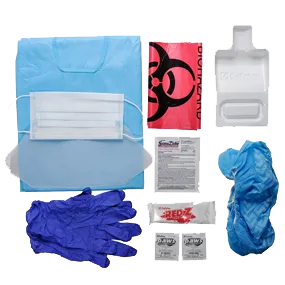
12- Healthcare Self Transport
Healthcare providers who deliver in-home medical services shall remove or have removed by a registered biomedical waste transporter all biomedical waste generated during the performance of services.
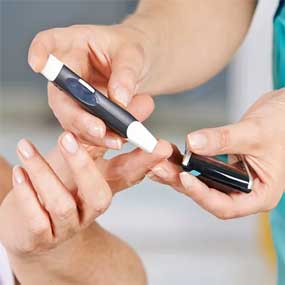
13- Labeling
Exterior bag (bag lining transport container) mustbe labeled with generator’s:
– Name / Name Business
– Address
Outer container must be labeled with transporter’s:
– Name
– Address
– Registration number
– 24 hour telephone contact number
– Biomedical Waste symbol and phrases
14- Recordkeeping
All biomedical waste management records shall be maintained for 3 years.


